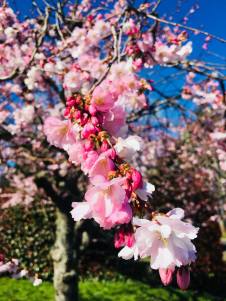Dear Skykomish Valley Residents,

Dandelion pollen is a part of the honey bee’s diet. Please consider keeping all or some of dandelions in your yard for bees and other pollinators.
Happy and safe spring to you and your families!
Please share this information with your family, friends and neighbors:
Toxic chemicals for yard and lawn care can impact people’s health, especially children and pregnant women. Pesticides can drift in air and water, contaminate private and public drinking water sources, and negatively affect non-targeted plants, animals, and people.
We highly recommend that you do not surround yourself and your family with toxic synthetic chemicals, put them around, on or in you.
“ALTERNATIVES TO TOXIC CHEMICALS FOR YARD AND LAWN”
WEEDS
As an alternative to Roundup, 2,4-D and other toxic synthetic chemicals, we suggest that you manually pull weeds, wilt them with boiling water or steam, or mix and spray 1 gal. vinegar, 1 cup Epsom salts, and ¼ cup Dawn dish detergent directly on leaves of targeted plants. Use caution. Please consider moss as an economical ground cover. To keep moss out, maintain a healthy lawn. More information Please consider keeping all or some of dandelions for bees and other pollinators. For control of blackberries, use goats or cut / mow vines to the ground, dig out roots.
INSECTS, ANTS
Seal cracks and holes, wipe surfaces, remove clutter, keep area clean and dry. More information
Homemade ant bait: 1 cup of warm water, ½ cup of sugar, 3 tablespoons of Borax. Soak the mixture into the cotton balls or paper towels. Place these in shallow dishes near where you’ve seen the ants. Do NOT kill the ants you do see, as it would prevent them from taking the toxic food back to the nest and feeding it to the rest of the colony. More information
RATS, MICE
Rats and mice are a source of food for many animals and birds such as bobcats, cougars, coyotes, eagles, hawks and more.
Please do not use rat poison or toxic bait. Poisonous pellets may be attractive and harmful to small children. It can kill pets and wildlife, and the predators that eat the poisoned rodents (leading to more rodents, in the long term, due to fewer predators!). To prevent entry by rats and mice, seal holes inside and outside buildings. Keep areas clean and free of crumbs and water. Seal food in rodent-proof containers. Use snap-traps instead of baits whenever possible. Keep the traps indoors where wildlife such as birds and other non-targeted animals will not become accidental victims of the traps. In extreme cases, call a qualified professional.
SLUGS

Slugs play a key role in the Pacific Northwest forests.
According to an article in The Bellingham Herald “A pest to gardeners, slugs play key role in Pacific Northwest” , “slugs are decomposers, animals that break down vegetation, turning it into the rich soil that feeds the Northwest’s native forests…They’re important especially for the spread of mushroom spores.” Thrushes, starlings and ducks eat slugs with gusto. To control slug population in your garden, please remove manually and place them in a remote forest location or use sparingly “Sluggo Pet & Wildlife Safe Slug and Snail Killer”.
MOLD, MILDEW
Citrus seed extract (such as grapefruit) has citric acid and does not have an odor. Dilute about 20 drops of extract with 2 cups of water, mix in a spray bottle and spray onto the mold/mildew. Let it dry and do not rinse. More information
More information for alternatives to toxics:
> Tips for Weeds, Lawns and Landscaping
> Taking Care of Your Lawn Without Using Pesticides
> Tips for Indoor and Outdoor Pests
> Pesticide and Herbicide Factsheets
> Northwest Center for Alternatives to Pesticides (NCAP)
Warm regards,
SVENA Team
svena.org
